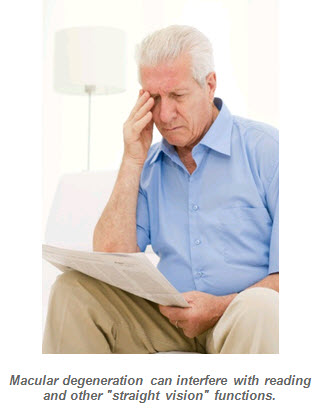Age Related Macular Degeneration: What Caregivers of Seniors Need to Know

Up to 11 million people in this country have some form of age-related macular degeneration, and that number is expected to double by the year 2050, according to the BrightFocus Foundation. Because age is a major risk factor for this chronic disease, it’s particularly important for elder caregivers to understand this leading cause of irreversible vision loss for people over the age of 60. Here’s what you need to know.
Age-related macular degeneration is the breakdown of the central area of the retina, also known as the “macula.” While this condition is not painful, it can lead to to irreversible vision loss, including the inability to see fine details, compromising “straight ahead” functions, including everything from driving to recognizing faces.
There are two different types of macular degeneration. The most common form, “dry” macular degeneration,” accounts for 90 percent of all cases, and occurs when the macula’s light sensitive cells degrade. Much less common, “wet” macular degeneration leads to 90 percent of all legal blindness cases, and is considered an “advanced” form of the disease. While some cases of dry macular degeneration do progress to the wet form, this does not occur in all cases.
Risk Factors for Macular Degeneration
Age is a contributing factor for the disease; according to the BrightFocus Foundation, a person’s risk increases from 2 percent between the ages of 50 and 59 to 30 percent past the age of 75.
A healthy lifestyle is also essential to reducing your risk. According to NIHSeniorHealth, smoking, obesity, an unhealthy diet, cardiovascular disease, and high cholesterol also play a role in your risk of developing macular degeneration.
Other risk factors, however, are out of an individual’s control, including race — whites are more commonly affected than African Americans — and family history. Research also indicates that women are more vulnerable to age-related macular degeneration than men.
Symptoms of Macular Degeneration
According to the Mayo Clinic, macular degeneration symptoms typically develop gradually, and may affect one or both eyes. They include vision changes such as the need for more light during detail-oriented work, difficulty with adjusting to lower light environments, blurriness with printed materials, a decrease in color intensity, difficulty recognizing faces, increased overall haziness, crooked central vision, blurred or blind spots, and vision hallucinations.

Treatment for Age-Related Macular Degeneration
While there’s no cure for macular degeneration, early diagnosis and treatment can reduce the progression of the disease. According to research from the National Eye Institute (NEI), a precise formulation of vitamins and minerals can not only slow the disease’s progression, but may also reduce your risk of developing vision loss in your alternate eye. There are also some emerging drug therapies which offer promising treatment potential.Surgery — in which a telescopic lens is implanted in one eye — can also magnify vision, potentially improving the quality of life for people with advanced macular degeneration.
Coping Mechanisms
While macular degeneration doesn’t usually lead to total blindness, it can affect central visions, therefore compromising the ability to read, drive, and recognize loved ones. Your aging loved one may benefit from working with an occupation therapist or low vision rehabilitation specialist to cope with his/her changing vision.
Additionally, adjusting to life with macular degeneration can take a mental toll as well as a physical one. In addition to support from friends and family members, talking with a counselor or joining a support group may help your loved one adapt.

